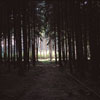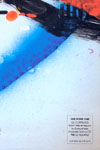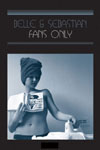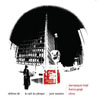Touch
I can think of no instrument capable of drones as complex, distinct, orprimitive as those generated by the pipe organ. The experience ofsitting below a great organ's clustered form, letting its breath washthe length of a cathedral, can be compared to viewing one ofRembrandt's late self-portraits, watching as each square-centimeterteems with an infinity of golden life, an inner millennium findingperfect equivalent in the sustained blast of an organ note. As if itstextural prowess and sacred acoustics were not enough, the organrepresents also a milestone in the mechanization of musicalinstruments, making it a prime target for this kind of tribute, avirtual who's-who of Touch's roster, some of the most recognizablenames in electro-acoustic music, all willing to shed their respectiveskins and make some music created with, or inspired by, organ sounds.Thankfully, most everyone included manages to come at the pipes in athoughtful and largely unique way, making
Spirean endlessly interesting, if not always enjoyable compilation. Therange of different approaches, which in many cases depart significantlyfrom their composers' tested styles, proves both a blessing and acurse, where the sequencing of the two discs inevitably interferes withthe enjoyment of the individual tracks. Many interesting pieces seem toend prematurely or appear dwarfed by the enormity or lavishness oftheir surroundings. The contributions of Philip Jeck and Leif Elggren,shorter tracks focusing on solitary, largely unadulterated organblasts, fail to stand out among the longer, similarly fundamental orminimalist approaches of Biosphere and BJNilsen. Likewise, some of themore concept-oriented inclusions end up sounding much better on paperthan on disc, one example being Finnbogi P?ursson's "Diabolus" in whichthe artist's homemade single-pipe organ creates a low-frequency toneinterval that in Medieval times was referred to the "devil in music"but is barely audible here. In contrast, other loosely-conceptual worksmake for some of the best material, like Z'EV's woozy "If only thatlove let's letting happen," based entirely on samples of Bach's organmusic found via a Google search, and Toshiya Tsunoda's ambient"Layered," produced by a homemade shortwave radio organ set outside ona midsummer night. Generally, tracks on the second disc make for themost enjoyable pieces because they are long enough to become thicklyatmospheric, to fill the room with the same arresting, monumental calmthat great cathedral organs produce. BJNilsen (aka Hazard) actuallycomposed "Breathe" for performance at St. Mary's Church in WarwickEngland. The half-hour piece, a simple, unfolding drone spanning hugeintervals on organs constructed as early as 1898, is one of
Spire'smost spare works and one of its most impressive. Other highlights fromthe disc include an Oren Ambarchi and Tom Recchion piece originallyreleased on a limited IDEA 7"; it makes sense here because Recchionplays Hammond on the track, though it is admittedly more in line withAmbarchi's solo work that anything particularly "organ-inspired."
Spireends with new music from field recording guru Chris Watson whose windrecordings become an allegory identifying the organ with the elementalor divine act of harnessing the air, as well as associating theinstrument with a image of majesty that seems wholly justified at theclose of such a compilation.
samples:
 Arthur Russell died in 1992, leaving an enigmatic body of work that took in avant-garde composition, Indian classical music, atmospheric cello-driven pop, and most crucially, a handful of mysterious and entrancing 12" disco sides. The term "mutant disco" and "leftfield groove" had to be invented to pigeonhole Russell's forays into the embryonic NYC disco scene of the late seventies and early eighties.
Arthur Russell died in 1992, leaving an enigmatic body of work that took in avant-garde composition, Indian classical music, atmospheric cello-driven pop, and most crucially, a handful of mysterious and entrancing 12" disco sides. The term "mutant disco" and "leftfield groove" had to be invented to pigeonhole Russell's forays into the embryonic NYC disco scene of the late seventies and early eighties.


 I can think of no instrument capable of drones as complex, distinct, orprimitive as those generated by the pipe organ. The experience ofsitting below a great organ's clustered form, letting its breath washthe length of a cathedral, can be compared to viewing one ofRembrandt's late self-portraits, watching as each square-centimeterteems with an infinity of golden life, an inner millennium findingperfect equivalent in the sustained blast of an organ note. As if itstextural prowess and sacred acoustics were not enough, the organrepresents also a milestone in the mechanization of musicalinstruments, making it a prime target for this kind of tribute, avirtual who's-who of Touch's roster, some of the most recognizablenames in electro-acoustic music, all willing to shed their respectiveskins and make some music created with, or inspired by, organ sounds.Thankfully, most everyone included manages to come at the pipes in athoughtful and largely unique way, making Spirean endlessly interesting, if not always enjoyable compilation. Therange of different approaches, which in many cases depart significantlyfrom their composers' tested styles, proves both a blessing and acurse, where the sequencing of the two discs inevitably interferes withthe enjoyment of the individual tracks. Many interesting pieces seem toend prematurely or appear dwarfed by the enormity or lavishness oftheir surroundings. The contributions of Philip Jeck and Leif Elggren,shorter tracks focusing on solitary, largely unadulterated organblasts, fail to stand out among the longer, similarly fundamental orminimalist approaches of Biosphere and BJNilsen. Likewise, some of themore concept-oriented inclusions end up sounding much better on paperthan on disc, one example being Finnbogi P?ursson's "Diabolus" in whichthe artist's homemade single-pipe organ creates a low-frequency toneinterval that in Medieval times was referred to the "devil in music"but is barely audible here. In contrast, other loosely-conceptual worksmake for some of the best material, like Z'EV's woozy "If only thatlove let's letting happen," based entirely on samples of Bach's organmusic found via a Google search, and Toshiya Tsunoda's ambient"Layered," produced by a homemade shortwave radio organ set outside ona midsummer night. Generally, tracks on the second disc make for themost enjoyable pieces because they are long enough to become thicklyatmospheric, to fill the room with the same arresting, monumental calmthat great cathedral organs produce. BJNilsen (aka Hazard) actuallycomposed "Breathe" for performance at St. Mary's Church in WarwickEngland. The half-hour piece, a simple, unfolding drone spanning hugeintervals on organs constructed as early as 1898, is one of Spire'smost spare works and one of its most impressive. Other highlights fromthe disc include an Oren Ambarchi and Tom Recchion piece originallyreleased on a limited IDEA 7"; it makes sense here because Recchionplays Hammond on the track, though it is admittedly more in line withAmbarchi's solo work that anything particularly "organ-inspired." Spireends with new music from field recording guru Chris Watson whose windrecordings become an allegory identifying the organ with the elementalor divine act of harnessing the air, as well as associating theinstrument with a image of majesty that seems wholly justified at theclose of such a compilation.
I can think of no instrument capable of drones as complex, distinct, orprimitive as those generated by the pipe organ. The experience ofsitting below a great organ's clustered form, letting its breath washthe length of a cathedral, can be compared to viewing one ofRembrandt's late self-portraits, watching as each square-centimeterteems with an infinity of golden life, an inner millennium findingperfect equivalent in the sustained blast of an organ note. As if itstextural prowess and sacred acoustics were not enough, the organrepresents also a milestone in the mechanization of musicalinstruments, making it a prime target for this kind of tribute, avirtual who's-who of Touch's roster, some of the most recognizablenames in electro-acoustic music, all willing to shed their respectiveskins and make some music created with, or inspired by, organ sounds.Thankfully, most everyone included manages to come at the pipes in athoughtful and largely unique way, making Spirean endlessly interesting, if not always enjoyable compilation. Therange of different approaches, which in many cases depart significantlyfrom their composers' tested styles, proves both a blessing and acurse, where the sequencing of the two discs inevitably interferes withthe enjoyment of the individual tracks. Many interesting pieces seem toend prematurely or appear dwarfed by the enormity or lavishness oftheir surroundings. The contributions of Philip Jeck and Leif Elggren,shorter tracks focusing on solitary, largely unadulterated organblasts, fail to stand out among the longer, similarly fundamental orminimalist approaches of Biosphere and BJNilsen. Likewise, some of themore concept-oriented inclusions end up sounding much better on paperthan on disc, one example being Finnbogi P?ursson's "Diabolus" in whichthe artist's homemade single-pipe organ creates a low-frequency toneinterval that in Medieval times was referred to the "devil in music"but is barely audible here. In contrast, other loosely-conceptual worksmake for some of the best material, like Z'EV's woozy "If only thatlove let's letting happen," based entirely on samples of Bach's organmusic found via a Google search, and Toshiya Tsunoda's ambient"Layered," produced by a homemade shortwave radio organ set outside ona midsummer night. Generally, tracks on the second disc make for themost enjoyable pieces because they are long enough to become thicklyatmospheric, to fill the room with the same arresting, monumental calmthat great cathedral organs produce. BJNilsen (aka Hazard) actuallycomposed "Breathe" for performance at St. Mary's Church in WarwickEngland. The half-hour piece, a simple, unfolding drone spanning hugeintervals on organs constructed as early as 1898, is one of Spire'smost spare works and one of its most impressive. Other highlights fromthe disc include an Oren Ambarchi and Tom Recchion piece originallyreleased on a limited IDEA 7"; it makes sense here because Recchionplays Hammond on the track, though it is admittedly more in line withAmbarchi's solo work that anything particularly "organ-inspired." Spireends with new music from field recording guru Chris Watson whose windrecordings become an allegory identifying the organ with the elementalor divine act of harnessing the air, as well as associating theinstrument with a image of majesty that seems wholly justified at theclose of such a compilation.  There's a level of innocence and melodic clarity present on this discthat makes me wonder why it hasn't received more recognition. Then thedetermining factor hits me: this is too sweet, almost comical in itslazy strolling. Greg Davis obviously has an ear for gorgeous sounds anthe ability to craft elegant stretches of sound, but unfortuneately itseems as if he doesn't have the ability to create a coherent record.All the instrumentation is from traditional (i.e., non-electronic)sources and then warped and rearranged in various manners by way oflaptop. The heart of each instrument is present in the mix so eachinstrument is readily identifiable; the sound of rain, birds singing,and other environmental sounds make their way behind the instrumentsand then... nothing. Almost all of these songs have absolutely noprogression and if they do, it takes six minutes or so for any movementto happen. "Improved Dreaming" begins with the charming sounds of a toymusic box chirping away above the sounds of a cartoonish galaxy full oftwinkling stars and wisps of astral dust and then flows into the soundof woodwinds sighing out an exquisite melody... over and over and overagain. The whole thing runs six minutes plus but it could've had a morestunning effect at perhaps half that length. One track wouldn'tnormally bug me so much, but there's so much excellent happening thatit angers me at how dull it becomes because of repetition. And theproblem is infectious. I could do without the singing, too. While thealbum might intentionally have a whimsical feeling, the vocals don'tadd to that, they simply sound cheesey and a bit out of place. Curling Pnd Woodshas a lot of excellent spots, but those excellent spots wear offquickly. I recommend it in small doses; two tracks at a time is morethan enough too keep the sweetness level low and the monotony at aminimum. These tracks could've captivated me had they been released asa series of EPs or singles.
There's a level of innocence and melodic clarity present on this discthat makes me wonder why it hasn't received more recognition. Then thedetermining factor hits me: this is too sweet, almost comical in itslazy strolling. Greg Davis obviously has an ear for gorgeous sounds anthe ability to craft elegant stretches of sound, but unfortuneately itseems as if he doesn't have the ability to create a coherent record.All the instrumentation is from traditional (i.e., non-electronic)sources and then warped and rearranged in various manners by way oflaptop. The heart of each instrument is present in the mix so eachinstrument is readily identifiable; the sound of rain, birds singing,and other environmental sounds make their way behind the instrumentsand then... nothing. Almost all of these songs have absolutely noprogression and if they do, it takes six minutes or so for any movementto happen. "Improved Dreaming" begins with the charming sounds of a toymusic box chirping away above the sounds of a cartoonish galaxy full oftwinkling stars and wisps of astral dust and then flows into the soundof woodwinds sighing out an exquisite melody... over and over and overagain. The whole thing runs six minutes plus but it could've had a morestunning effect at perhaps half that length. One track wouldn'tnormally bug me so much, but there's so much excellent happening thatit angers me at how dull it becomes because of repetition. And theproblem is infectious. I could do without the singing, too. While thealbum might intentionally have a whimsical feeling, the vocals don'tadd to that, they simply sound cheesey and a bit out of place. Curling Pnd Woodshas a lot of excellent spots, but those excellent spots wear offquickly. I recommend it in small doses; two tracks at a time is morethan enough too keep the sweetness level low and the monotony at aminimum. These tracks could've captivated me had they been released asa series of EPs or singles. Prolific sound artist John Duncan's newest disc finds him in a kind of half-collaboration with Asmus Tietchens, whose readings from two E.M. Cioran texts become sources for the voice manipulation that has characterized Duncan's work as of late. Cioran's name should sound familiar to Tietchens listeners, as quotes from the modern philosophe/aphorist frequently appear on the musician's sleeve notes. Duncan's notes here, however, express a clear distaste for the fatalism that dominates Cioran's philosophy, a kind of a-philosophy often abbreviated in cheeky, opaque aphorisms like the one displayed on Tietchens' new FT+: "It is simple to be "deep," just follow your own false bents."
Prolific sound artist John Duncan's newest disc finds him in a kind of half-collaboration with Asmus Tietchens, whose readings from two E.M. Cioran texts become sources for the voice manipulation that has characterized Duncan's work as of late. Cioran's name should sound familiar to Tietchens listeners, as quotes from the modern philosophe/aphorist frequently appear on the musician's sleeve notes. Duncan's notes here, however, express a clear distaste for the fatalism that dominates Cioran's philosophy, a kind of a-philosophy often abbreviated in cheeky, opaque aphorisms like the one displayed on Tietchens' new FT+: "It is simple to be "deep," just follow your own false bents." For the uninitiated, Dwelling craft music based on Portugese Fado, apoetic and emotive folk singing style that usually deals heavily inthemes of sorrow or love. Dwelling's approach is through acousticstring instrumentation begun by Nuno Roberto and the powerful andlovely voice of Catarina Reposo, who sings both in English andPortugese. Strangely, their music has also gained them a very largefollowing in the goth and metal communities, though the music rarelyapproaches anything resembling hard core or aggressive. This does notmean the music is not at all powerful, however. Humanais the ensemble's first full-length, after releasing an EP in 2000, andthe very least I can say is that their hearts are very much in thismusic. This is very much the motif of Fado, so it's not surprising, butthe guitar interplay and addition of violin are exquisitely played withsuch passion and life that there can be no doubt this group loves whatthey do. I found it especially interesting that there is no percussion,nor is any necessary. These songs are just fine the way they are, likea troupe of travelling minstrels entertaining the courts of manydignitaries. The borderline flamenco guitars, the fluid and stabbingviolin, and the voice of Reposo are captivating and hypnotizing. Not tosay that every song is a work of art, though, as I honestly prefer whenReposo doesn't sing in English, as it adds that layer of mystery, andEnglish with this music just smacks of wanting to reach a largeraudience. The overall feel is still incredibly moving, and fans of darkcompositions will find a lot to love here. -
For the uninitiated, Dwelling craft music based on Portugese Fado, apoetic and emotive folk singing style that usually deals heavily inthemes of sorrow or love. Dwelling's approach is through acousticstring instrumentation begun by Nuno Roberto and the powerful andlovely voice of Catarina Reposo, who sings both in English andPortugese. Strangely, their music has also gained them a very largefollowing in the goth and metal communities, though the music rarelyapproaches anything resembling hard core or aggressive. This does notmean the music is not at all powerful, however. Humanais the ensemble's first full-length, after releasing an EP in 2000, andthe very least I can say is that their hearts are very much in thismusic. This is very much the motif of Fado, so it's not surprising, butthe guitar interplay and addition of violin are exquisitely played withsuch passion and life that there can be no doubt this group loves whatthey do. I found it especially interesting that there is no percussion,nor is any necessary. These songs are just fine the way they are, likea troupe of travelling minstrels entertaining the courts of manydignitaries. The borderline flamenco guitars, the fluid and stabbingviolin, and the voice of Reposo are captivating and hypnotizing. Not tosay that every song is a work of art, though, as I honestly prefer whenReposo doesn't sing in English, as it adds that layer of mystery, andEnglish with this music just smacks of wanting to reach a largeraudience. The overall feel is still incredibly moving, and fans of darkcompositions will find a lot to love here. -  After a three year hiatus, Tomorrowland recently released this limitedpressing EP of songs on the mostly vinyl fledgling Red Antenna label. Anemoneis a continuation of their analog/electronic aesthetic, and it is apleasing listen overall, but not a giant leap forward in any case forSteve Baker and Nick Brackney. That's not necessarily a bad thing —it's admirable for a band to stick to their guns — but it means thatthe duo risk sounding like so many other like bands. The addition oflive drumming by Eric Morrison is a good step, but it's not enough tomake this release particularly noteworthy in their catalog. Withoutreal change there can be no evolution, and survival of the fittestwould leave Tomorrowland in yesterdayland. That said, there are severalpeaks to be found on their latest, most notably the first (and title)track. Eerie computer noise and processed beats kick it off, withswirls and deep bass joining in fairly quickly. It's a perfect bodymoving song, where body parts do their own thing and it's always fluid.Then the big beat drops in and the energy pumps up to eleven.Unfortunately, this begins a stasis that lasts for half the songs,where guitar noise and synthetic whine and gurgle meet with live orelectronic beats and just stay. There's a little play, but no realpeaks and valleys to speak of. The songs just aren't engaging enough.Occasionally I got pulled in, like on "Chromosome" or "Meiosis," butthen something breaks the streak — like the awkward drumming opening of"Catalyst" or the all-out noise of "Unfadeable" — and I reach for theeject button or the volume knob. It's nice to know Tomorrowland arestill around making the music that matters to them, but a littlereaching, even if it means falling occasionally, could take them a longway.
After a three year hiatus, Tomorrowland recently released this limitedpressing EP of songs on the mostly vinyl fledgling Red Antenna label. Anemoneis a continuation of their analog/electronic aesthetic, and it is apleasing listen overall, but not a giant leap forward in any case forSteve Baker and Nick Brackney. That's not necessarily a bad thing —it's admirable for a band to stick to their guns — but it means thatthe duo risk sounding like so many other like bands. The addition oflive drumming by Eric Morrison is a good step, but it's not enough tomake this release particularly noteworthy in their catalog. Withoutreal change there can be no evolution, and survival of the fittestwould leave Tomorrowland in yesterdayland. That said, there are severalpeaks to be found on their latest, most notably the first (and title)track. Eerie computer noise and processed beats kick it off, withswirls and deep bass joining in fairly quickly. It's a perfect bodymoving song, where body parts do their own thing and it's always fluid.Then the big beat drops in and the energy pumps up to eleven.Unfortunately, this begins a stasis that lasts for half the songs,where guitar noise and synthetic whine and gurgle meet with live orelectronic beats and just stay. There's a little play, but no realpeaks and valleys to speak of. The songs just aren't engaging enough.Occasionally I got pulled in, like on "Chromosome" or "Meiosis," butthen something breaks the streak — like the awkward drumming opening of"Catalyst" or the all-out noise of "Unfadeable" — and I reach for theeject button or the volume knob. It's nice to know Tomorrowland arestill around making the music that matters to them, but a littlereaching, even if it means falling occasionally, could take them a longway.  Those who have taken the time to check out the recently updated Contributors page for The Brain may have noticed my Top 10 list for 2003. Collectively, the readers made so many lousy choices in this year's poll that I felt compelled to remind everyone that there were far more worthwhile releases in this past year than were reflected by the all-too-predictable choices. One such example comes from French producer Jonas Bering on the high-quality Kompakt label, whose releases continue to set the bar for progressive electronic music.
Those who have taken the time to check out the recently updated Contributors page for The Brain may have noticed my Top 10 list for 2003. Collectively, the readers made so many lousy choices in this year's poll that I felt compelled to remind everyone that there were far more worthwhile releases in this past year than were reflected by the all-too-predictable choices. One such example comes from French producer Jonas Bering on the high-quality Kompakt label, whose releases continue to set the bar for progressive electronic music. Five Point One is comprised of two discs: a DVD compiling all ten the videos from Cornelius's 2002 album Point
and an audio CD of remixes from the album contributed by fans as part
of a contest. The videos, while creative, have a subtle, background
feel to them, and seem to be intended more for use in Cornelius's live
shows than on their own (and indeed, they were played as a backdrop
during his tour for Point). While not wholly uninteresting, the
videos are static in their content, usually relying on one or two
primary images. "Point of View Point" shows cars and trains in motion,
while "Drop" features a little boy standing in front of a sink while
the water, synchonized to the beat, drips into the basin. The most
enjoyable of the videos is "Tone Twilight Zone," with its images of two
fingers walking (Yellow Pages-style) through a landscape of ordinary
household objects. The remix CD, PM, is a mixed bag, running
the gamut from electronic dance to japanoise to thrashy rock. Some are
cute and catchy, and others are forgettable.
Five Point One is comprised of two discs: a DVD compiling all ten the videos from Cornelius's 2002 album Point
and an audio CD of remixes from the album contributed by fans as part
of a contest. The videos, while creative, have a subtle, background
feel to them, and seem to be intended more for use in Cornelius's live
shows than on their own (and indeed, they were played as a backdrop
during his tour for Point). While not wholly uninteresting, the
videos are static in their content, usually relying on one or two
primary images. "Point of View Point" shows cars and trains in motion,
while "Drop" features a little boy standing in front of a sink while
the water, synchonized to the beat, drips into the basin. The most
enjoyable of the videos is "Tone Twilight Zone," with its images of two
fingers walking (Yellow Pages-style) through a landscape of ordinary
household objects. The remix CD, PM, is a mixed bag, running
the gamut from electronic dance to japanoise to thrashy rock. Some are
cute and catchy, and others are forgettable.
 Fans Only
takes on the task of documenting Belle & Sebastian's inception in
1995 through their seven years of recordings for Matador and Jeepster.
Their videos and live footage from various performances around ther
world are interwoven into behind-the-scenes material and interviews.
The videos proper are largely charmingly appropriate twee shots of the
band (there are at least a few where they're seen clutching various
stuffed animals) and their friends using super-8 cameras and other
low-budget equipment. Highlights include a rendition of France Gall's
"Poupee de Cire, Poupee de Son," recorded for French television and the
video for "Legal Man," which features the band decked out in full mod
regalia on stage in a decadent nightclub surrounded by freely flowing
martinis and bellydancers, and a hilarious interview with the band for
a Brazilian TV show. Clocking in at 136 minutes, Fans Only
drags at times, but is for the most entertaining and does an excellent
job of capturing the lighthearted, playful essence of the band.
Fans Only
takes on the task of documenting Belle & Sebastian's inception in
1995 through their seven years of recordings for Matador and Jeepster.
Their videos and live footage from various performances around ther
world are interwoven into behind-the-scenes material and interviews.
The videos proper are largely charmingly appropriate twee shots of the
band (there are at least a few where they're seen clutching various
stuffed animals) and their friends using super-8 cameras and other
low-budget equipment. Highlights include a rendition of France Gall's
"Poupee de Cire, Poupee de Son," recorded for French television and the
video for "Legal Man," which features the band decked out in full mod
regalia on stage in a decadent nightclub surrounded by freely flowing
martinis and bellydancers, and a hilarious interview with the band for
a Brazilian TV show. Clocking in at 136 minutes, Fans Only
drags at times, but is for the most entertaining and does an excellent
job of capturing the lighthearted, playful essence of the band.  MIO continues what's looking like a campaign to reissue all the lost gems of the Nurse With Wound list with this long-forgotten and seminal document of the French progressive scene. Birgé Gorgé Shiroc were Jean-Jacques Birgé, Francis Gorgé, and Shiroc before the first two formed the flagship prog collective Un Drame Musical Instantane. Recorded in 1975, Défense de is their only record under the BGS moniker, entering the arms of obscurity only one year before Un D.M.I. became active. As such, the record paints a picture of the Birgé and Gorgé in an early stage of their development, but one that was already overflowing with good ideas.
MIO continues what's looking like a campaign to reissue all the lost gems of the Nurse With Wound list with this long-forgotten and seminal document of the French progressive scene. Birgé Gorgé Shiroc were Jean-Jacques Birgé, Francis Gorgé, and Shiroc before the first two formed the flagship prog collective Un Drame Musical Instantane. Recorded in 1975, Défense de is their only record under the BGS moniker, entering the arms of obscurity only one year before Un D.M.I. became active. As such, the record paints a picture of the Birgé and Gorgé in an early stage of their development, but one that was already overflowing with good ideas.
